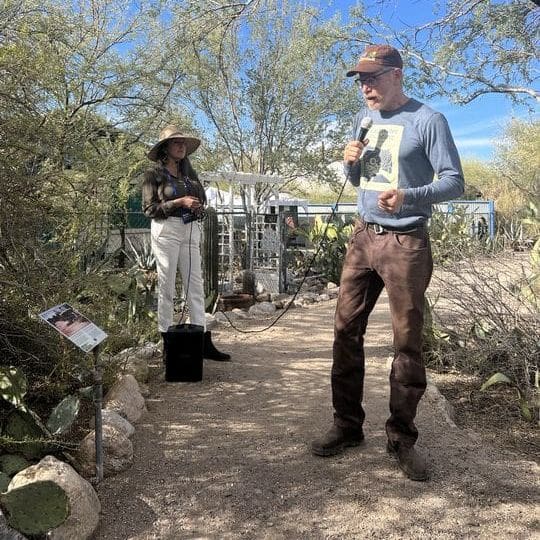At last month’s One Water Summit, José, Jessica, and I got to join a “Storm to Shade” green infrastructure tour hosted by Tucson Water that beautifully illustrated the value of water. It started in Barrio Centro, where artists and organizers from Flowers & Bullets showed us the pocket park they created out of a vacant lot so that kids waiting for the bus would have a place to play, and the shuttered school they reimagined as a farm and community center.
Next, Brad Lancaster gave us a tour of his Dunbar Springs neighborhood, where curb cuts and basins catch rain to support native trees and shrubs, and planted roundabouts and streetside gardens calm traffic, cool the streets, and create a commons where residents gather to harvest food.
The timing for this tour could not have been more perfect. The Water Hub team has been working all year to communicate the impact water dollars in the Bipartisan Infrastructure Law (BIL) and Inflation Reduction Act (IRA) will have in communities and ecosystems. We have hosted media briefings, supported press coverage and op-eds, worked with online influencers, and polled voters about infrastructure priorities. We also recently released this message guide, the first in a suite of materials we will roll out in early 2024, to help advocates celebrate progress facilitated by the BIL and IRA and make the case for ongoing water funding.

City of Tucson) hosting a green infrastructure tour of Dunbar Springs in Tucson, AZ.
Seeing the way “planting the rain” with green stormwater infrastructure made Tucson neighborhoods more vibrant, safe, and resilient reminded us how transformative water investments can be, and how critical they are in this age of climate-driven warming, super storms, and megadrought.
Disasters have displaced millions of people this year, and caused many billions of dollars in damages. Extreme weather events reliably make headlines, but often media attention moves on long before residents have fully recovered, and it can be hard to insert solution stories in the midst of a crisis. But it’s essential that we fund prevention and preparedness, so that people can feel safe in their homes and neighborhoods.
We are proud to work with leaders such as Heather Tanana, Monica Lewis-Patrick, Angel Santiago Fernandez-Bou, Jessica Dandridge, Susana De Anda, Sri Vedachalam, Julian Gonzalez, Ayanna Jolivet-McCloud, Huda Alkaff, and Maritza Mendoza to uplift solutions underway in their communities, urge ongoing investment, and model a different kind of relationship to water, one that is grounded in care and respect.
This is exactly why #community #groups, #frontline, and #most #impacted continue to make the case that investment in infrastructure is very much needed and we must ensure that every #American can #afford their #water & #sewage cost! https://t.co/YcVVc3Sbja
— Monica Lewis Patrick (@MonicaLewisPat2) October 24, 2023
From lead pipes to sewer overflows, and water shutoffs to fish kills, we know the nation’s water problems are solvable if we decide, collectively, that healthy rivers and safe drinking water are priorities that deserve strong laws, adequate funding, and community capacity. It is our great honor at the Water Hub to work with groups building that public and political will and leading real change on the ground.